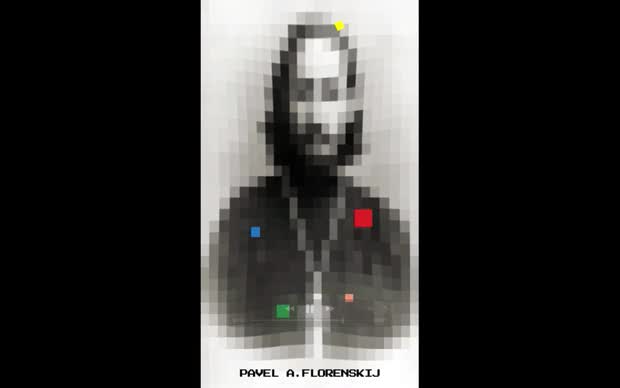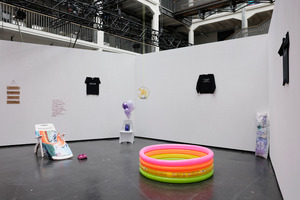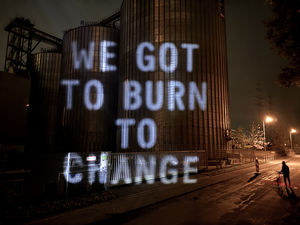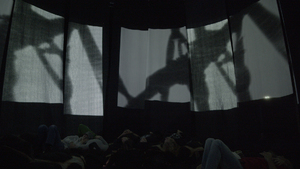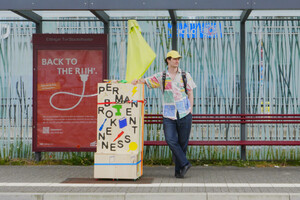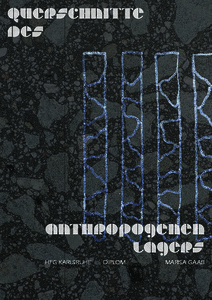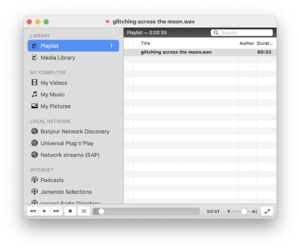I Cried A Smile
Benachbarte Sets (43)Alle Zusammenhänge anzeigen
Diese Sets wurden den gleichen Sets hinzugefügt wie das ausgewählte Set.
43 Inhalte
- Seite 1 von 4
Ghost Story
- Titel
- Ghost Story
- Autor/in
- Beschreibung (en)
- The project was born in response to the passing of an unaccompanied homeless individual in 2018, a person without known family or friends. Her death was cataloged—reduced to data archived in newsrooms and on digital servers. Yet, if this data remains untouched, and her memory fades into obscurity, does her existence persist? She lingers and remains unseen—a paradoxical state of both presence and absence. Within the digital void, she exists as a spectral trace, haunting the silence, waiting to be rediscovered, forever closed in on herself.
Such is the nature of ghosts—the living create them. We resurrect the departed in our own ways, through rituals, texts, and the intangible recipes of memory. We read, we create, we consume, and through this, we invite the dead to inhabit us once more. This project is an assemblage of fragments—an exploration of the processes through which we become haunted by the past.
- The project was born in response to the passing of an unaccompanied homeless individual in 2018, a person without known family or friends. Her death was cataloged—reduced to data archived in newsrooms and on digital servers. Yet, if this data remains untouched, and her memory fades into obscurity, does her existence persist? She lingers and remains unseen—a paradoxical state of both presence and absence. Within the digital void, she exists as a spectral trace, haunting the silence, waiting to be rediscovered, forever closed in on herself.
- Kategorie
- Typ des Projekts/Werks
- Schlagworte
- Datierung
- 18.04.2024
- Dank an
- Sprache
- Material
- Ort
- Pförtnerhäuser, Alter Schlachthof
- Stadt
- Land
- Titel
- Ghost Story
- Projektleiter/in
- Semester
- Studiengang
- Typ der Abschlussarbeit
- Importiert am
- 25.09.2024
- Übergeordnete Sets
- 0
- Set enthält
- 0 9
G.O.T.T.A.L.I.S.T.E.N.
- Titel
- G.O.T.T.A.L.I.S.T.E.N.
- Autor/in
- Beschreibung (de)
- "GOTTALISTEN", kurz für „Grab One Terrene Thought And Let It Slide To Eternal Nothingness”, beschäftigt sich mit der Zeit der Oktoberrevolution in Russland im Jahr 1917. Die Klebeband-Leinwände nehmen Bezug auf den Künstler Kasimir Malewitsch, der während dieser Epoche in Russland lebte. Zudem setzt Claus sich mit dem russischen Religionsphilosoph, Priester, Mathematiker und Kunstwissenschaftler Pavel Florenskij auseinander.
- Beschreibung (en)
- "GOTTALISTEN", short for "Grab One Terrene Thought And Let It Slide To Eternal Nothingness", deals with the time of the October Revolution in Russia in 1917. The tape canvases refer to the artist Kasimir Malewitsch, who lived in Russia during this era. Claus also deals with the Russian religious philosopher, priest, mathematician and art historian Pavel Florenskij.
- Kategorie
- Schlagworte
- Titel
- G.O.T.T.A.L.I.S.T.E.N.
- Projektleiter/in
- Semester
- Studiengang
- Typ der Abschlussarbeit
- Importiert am
- 08.08.2024
- Übergeordnete Sets
- 0
- Set enthält
- 1 27
In Defense of Mis Caprichos
- Titel
- In Defense of Mis Caprichos
- Untertitel
- – When someone says you canʼt do something. Do it twice, and take pictures.
- Autor/in
- Beschreibung (de)
- „In Defense of Mis Caprichos“ ist eine multimediale Ausstellung, die auf einem selbst kuratierten Archiv von 140 gefundenen und eigenen Bildern basiert. Sie setzt sich mit der vernakulären Bildsprache Lateinamerikas auseinander – von Memes und persönlichen Fotos bis zu Screenshots. Viele Bilder sind durch digitale Verbreitung nur in niedriger Auflösung erhalten und spiegeln so die visuelle Textur des Internets wider. Sie vermitteln eine Sensibilität, die sich nicht erklären lässt, sondern sich durch Stimmung, Ton und Wiederholung entfaltet. Viele der Bilder stammen aus oder zeigen Kontexte des Globalen Südens und verstehen sich als Hommage an dortige alltägliche, informelle Gesten. Zusammen bilden sie eine visuelle Sprache, die intim, vielschichtig, instabil und oft humorvoll ist.
Das Projekt bezieht sich auf Hal Fosters Aufsatz „An Archival Impulse“, der das Archivieren als künstlerische Praxis versteht und Fragmentierung der Kohärenz vorzieht – zentrale Konzepte für dieses sich stetig wandelnde Archiv. Daraus wurden zehn künstlerische Objekte entwickelt, die die Skurrilitäten der Sammlung erfassen: Repliken, Performances oder hybride Assemblagen. Ihre Logik beruht auf Aneignung, Kopie und Transformation – im Sinne Byung-Chul Hans, der Replikation als kreative Strategie für neue Bedeutungen begreift.
Einige Werke greifen konkrete Bilder auf: Eine Performance, bei der ein Plastikpool auf einem Motorrad transportiert wird, bezieht sich auf ein Archivbild. Ein anderes verwandelt einen falsch übersetzten Tweet in ein dekoratives Holzschild. Ein drittes ist ein Traumfänger aus gelber Unterwäsche – inspiriert von einem kolumbianischen Neujahrsbrauch, wonach gelbe Unterwäsche Glück bringen soll.
Ein zentrales Element ist eine Videoarbeit, die das gesamte Archiv in Endlosschleife zeigt, begleitet von Texten aus unterschiedlichen Quellen: akademisch, persönlich oder aus sozialen Medien. Die Anordnung ist nicht erklärend, sondern atmosphärisch. Die Ausstellung schafft einen hierarchiefreien Raum, der Intuition, spielerische Ernsthaftigkeit und visuelle Alltagskulturen in den Mittelpunkt stellt.
- „In Defense of Mis Caprichos“ ist eine multimediale Ausstellung, die auf einem selbst kuratierten Archiv von 140 gefundenen und eigenen Bildern basiert. Sie setzt sich mit der vernakulären Bildsprache Lateinamerikas auseinander – von Memes und persönlichen Fotos bis zu Screenshots. Viele Bilder sind durch digitale Verbreitung nur in niedriger Auflösung erhalten und spiegeln so die visuelle Textur des Internets wider. Sie vermitteln eine Sensibilität, die sich nicht erklären lässt, sondern sich durch Stimmung, Ton und Wiederholung entfaltet. Viele der Bilder stammen aus oder zeigen Kontexte des Globalen Südens und verstehen sich als Hommage an dortige alltägliche, informelle Gesten. Zusammen bilden sie eine visuelle Sprache, die intim, vielschichtig, instabil und oft humorvoll ist.
- Kategorie
- Typ des Projekts/Werks
- Schlagworte
- Dank an
- Sprache
- Material
- Technik/Verfahren/Formate
- Diashow / Sculpture / Performance
- Ort: Institution
- Ort
- Lichthof 4
- Stadt
- Land
- Titel
- In Defense of Mis Caprichos
- Projektleiter/in
- Semester
- Studiengang
- Typ der Abschlussarbeit
- Importiert am
- 27.06.2025
- Übergeordnete Sets
- 0
- Set enthält
- 5 1
“I see” “with my voice”
- Titel
- “I see” “with my voice”
- Autor/in
- Beschreibung (de)
- „I see“ „with my voice“ beschäftigt sich mit Themen wie Transformation, Gestaltwandel und Materialität durch ein Zusammenspiel von literarischen Fragmenten und entliehenen Stimmen. Das Ergebnis ist eine nicht-lineare, fluide Erzählung, die die flüchtige Natur von Visionen, Träumen und Metamorphosen einfängt.
- Beschreibung (en)
- “I see” “with my voice” engages with themes of transformation,
shapeshifting, and materiality through an interplay of literary
fragments and borrowed voices, resulting in a non-linear, fluid
narrative that encapsulates the ephemeral nature of visions,
dreams, and metamorphoses.
This project draws substantial inspiration from Alice Notley's
The Descent of Alette, a transformative odyssey that employs
rhythmic spoken language to explore continuous change.
Alongside Notley’s influence, the works of Hildegard von Bingen,
a 12th-century mystic, and the visionary narratives from the
biblical book of Ezekiel, serve as foundational texts that inform
the thematic and structural framework of this piece.
The text is presented as an audio recording, whispered as a 20 minute loop.
Visitors can listen to the piece when pressing their ear against the tents walls.
My objects are performers, maybe even imposters: frozen in a state of change or mimicry. My objects are performers, maybe even imposters: frozen in a state of change or mimicry.
They are skillfull imitators, but you can tell something is off.
Moving along this crack between the believable and the not quite right, I like to engage
with different realities and states of being. The artificial, almost real-life fakeness of their with different realities and states of being. The artificial, almost real-life fakeness of their
surfaces set the stage for my narrative of transformation, imitation and shapeshifting.
1. A wooden house crafted from smooth denim. Made by sanding the grain of wood
onto the denim fabric
2. Heavy fog covering the floor that could be perceived as dew, mixed with a light subtle
smoke of Incense burning.
The fragrance envokes sacred, holy feelings with its warm, resinous smell with peppery The fragrance envokes sacred, holy feelings with its warm, resinous smell with peppery
undertones.
3. 100 cherries made from a thick mixture of honey and almonds. The heavy sweetness
of the stoneless candy-imposter meant to linger in the visitors mouth as it is tasted. of the stoneless candy-imposter meant to linger in the visitors mouth as it is tasted.
A thin gelatine film – imitating the coolnes of cherry skin as it touches the lips A thin gelatine film – imitating the coolnes of cherry skin as it touches the lips
The installation is accompanied by a small reader containing the three part text to be taken The installation is accompanied by a small reader containing the three part text to be taken
home and serve as a keep sake or document of the fleeting spoken text.
The reader is bound with one simple staple. It does not have a beginning or end, but The reader is bound with one simple staple. It does not have a beginning or end, but
rather works like a gif. No cover or back. Just like wheels turning endlessly in a nonlinear rather works like a gif. No cover or back. Just like wheels turning endlessly in a nonlinear
storytelling.
- “I see” “with my voice” engages with themes of transformation,
- Kategorie
- Typ des Projekts/Werks
- Schlagworte
- Datierung
- 18.04.2024
- Sprache
- Ort: Institution
- Ort
- “I see” “with my voice” at ZKM Pavillon, Karlsruhe
- Stadt
- Land
- Titel
- “I see” “with my voice”
- Projektleiter/in
- Semester
- Studiengang
- Typ der Abschlussarbeit
- Importiert am
- 19.09.2024
- Übergeordnete Sets
- 0
- Set enthält
- 0 2
Letters of Dissent
- Titel
- Letters of Dissent
- Titel (en)
- Letters of Dissent
- Autor/in
- Beschreibung (de)
- Mein Diplomprojekt mit dem Titel „LETTERS OF DISSENT“ hatte zum Ziel, praktische und zugängliche Mittel des nächtlichen Protests zu erforschen. Dieses Projekt, das sich mit der Wechselbeziehung von Geschichtenerzählen und Punk-Einflüssen befasst, soll durch künstlerische Intervention ein Schlaglicht auf soziale und politische Themen werfen. Es handelt sich um selbst geschriebene Erzählungen, die in einer auf optimale Lesbarkeit ausgelegten Schriftart verfasst sind. Die Einfachheit der verwendeten Technik sorgt für Tragbarkeit und Zugänglichkeit. Das Engagement der Gemeinschaft ist integraler Bestandteil des Werks, das sowohl als Lasercut- als auch als 3D-Druckversion vorliegt und als Open-Source-Initiative zur Verfügung gestellt wird. Die Gesamtästhetik ist von auffallender Helligkeit geprägt und schafft eine visuell beeindruckende und deutlich wahrnehmbare Präsenz. Neben der Hauptdiplomarbeit ist es erforderlich, neuere Arbeiten in einer Ausstellung zu präsentieren, in der sorgfältig ausgewählte Projekte vorgestellt werden. In dem Bemühen, das Ausstellungsdesign auf das übergreifende Thema des Diplomprojekts abzustimmen, zielte der Designansatz darauf ab, wesentliche Prinzipien wie Zugänglichkeit, Abfallminimierung und eine ephemere Pop-up-Sensibilität zu verkörpern.
- Beschreibung (en)
- My diploma project titled "LETTERS OF DISSENT," aimed to explore practical and approachable means of protesting during the nighttime. Delving into the interrelation of storytelling and punk influence, this project seeks to cast a spotlight on social and political subjects through artistic intervention. It involves self-written narratives, utilising a font designed for optimal readability. The simplicity of the technique employed ensures portability and accessibility. Community engagement is integral, using both a lasercut and 3D-print version of the work, which is made available as an open-source initiative. The overall aesthetic is marked by striking brightness, creating a visually impactful and overtly noticeable presence. In addition to the primary diploma project, it is required to showcase recent works in an exhibition, featuring carefully chosen projects. In an effort to align the exhibition design with the overarching theme of the diploma project, the design approach aimed to encapsulate essential principles such as accessibility, waste minimisation, and an ephemeral, pop-up sensibility.
- Kategorie
- Schlagworte
- Datierung
- 03.11.2023
- Titel
- Letters of Dissent
- Projektleiter/in
- Semester
- Studiengang
- Typ der Abschlussarbeit
- Importiert am
- 30.10.2024
- Übergeordnete Sets
- 3
- Set enthält
- 1 11
Manchmal ist Schmerz ganz leise
- Titel
- Manchmal ist Schmerz ganz leise
- Titel (en)
- Sometimes pain is very quiet
- Autor/in
- Beschreibung (de)
- „Manchmal ist Schmerz ganz leise“ ist eine immersive, autobiographische Hörstück-Installation, die den stillen und oft unsichtbaren Kampf mit einer schweren, namenlosen Krankheit in den Mittelpunkt stellt. Das Werk hinterfragt, was es bedeutet, in einer leistungsorientierten Gesellschaft plötzlich nicht mehr zu "funktionieren". Es geht den Ängsten, der Scham und dem tief empfundenen Gefühl des Versagens nach, das oft mit chronischer Krankheit einhergeht – Gefühle, die Betroffene selten teilen. Das Hörspiel verleiht einer Stimme Ausdruck, die für viele spricht und Einblicke in eine Realität gibt, die oft im Verborgenen bleibt.
- Beschreibung (en)
- ‘Sometimes pain is very quiet’ is an immersive, autobiographical audio play installation that focuses on the silent and often invisible battle with a serious, nameless illness. The work questions what it means to suddenly no longer ‘function’ in a performance-orientated society. It explores the fears, the shame and the deeply felt sense of failure that often accompanies chronic illness – feelings that are rarely shared by those affected. The radio play gives expression to a voice that speaks for many and provides insights into a reality that often remains hidden.
- Kategorie
- Typ des Projekts/Werks
- Schlagworte
- Datierung
- 30.10.2024
- Mitwirkende
- Dank an
- Finn Baygan
- Daniel Berwanger
- Pauline Cemeris
- Filipa Cesar
- Mark Patrick Damian
- Charlotte Eifler
- Flora Güldenpfennig
- Tobias Keilbach
- Eisenhart Keimeyer
- Alexander Knoppik
- Yael Kolb
- Isabelle Konrad
- Julian Kuf
- Barbara Kuon
- Josephine Leicht
- Laura Morcillo
- Ilja Morgenstern
- Sebastian Schäfer
- Sebastian Schönfeld
- Lorenz Schwarz
- Quirin Thalhammer
- Alexander Thelen
- Riemschneider Stiftung
- Zeitbild Lab
- Sprache
- Material
- Technik/Verfahren/Formate
- 4-Kanal-Audio/360° Projection Mapping
- Abmessungen
- Länge: 8m, Breite: 8m, Höhe: 6,50m
- Dauer
- 30min
- Ort: Institution
- Ort
- Großes Studio
- Stadt
- Land
- Titel
- Manchmal ist Schmerz ganz leise
- Projektleiter/in
- Semester
- Studiengang
- Typ der Abschlussarbeit
- Importiert am
- 17.04.2025
- Übergeordnete Sets
- 0
- Set enthält
- 1 5
Path Tiles
- Titel
- Path Tiles
- Titel (en)
- Path Tiles
- Untertitel
- Knitting Coordinates into Patterns
- Untertitel des Projekts/Werks (en)
- Knitting Coordinates into Patterns
- Autor/in
- Beschreibung (de)
- Unsere Bewegungen können wie eine Performance begriffen werden, wie etwas Flüchtiges, das nur im Moment existiert und nach der Vollendung weder sichtbar noch fassbar ist. Nur die Erinnerungen an das Erlebte bleiben als Spuren der Bewegung in unserem Geist erhalten. Path Tiles nutzt GPS-Daten, um diese besonderen Momente individueller Erfahrung einzufangen und in Form von Mustern in die physische Welt des sicht- und tastbaren Textils zu übertragen. Es entsteht eine tiefe Bindung zwischen Mensch und Objekt.
Jedes Muster steht für eine Reise, für eine Erfahrung. Dabei ist es egal, ob es sich um einen Spaziergang in der Natur, eine Reise in ein fernes Land oder einen wiederkehrenden Weg des Alltags handelt. Die daraus entstehenden Muster erzählen von den Gefühlen und Begegnungen, von dem Gesehenen und dem Erlebten und erinnern uns an das, was uns ausmacht.
Mit der Path Tiles Website habe ich ein Werkzeug entwickelt, um diese Reisen in Form von GPS-Daten in strickbare Muster zu verwandeln. Ich habe die Website so gestaltet, dass die Ästhetik des Musters durch zusätzliche Verschiebung, Verzerrung und Spiegelung individualisiert werden kann. Dies stellt außerdem sicher, dass Menschen mit der gleichen Strecke trotzdem persönliche Muster erstellen können. Das entstandene Muster wird dann in Form eines gestricktes Objekts zum Leben erweckt und wird zur materialisierten persönlichen Erfahrung. Durch die Einbeziehung des Nutzers in den Gestaltungsprozess entsteht eine weitere Ebene der Bindung zwischen Mensch und Objekt.
Für das Diplom habe ich exemplarisch fünf Objekte gestaltet, die mit diesen Mustern personalisiert werden können. Das Design der Objekte konzentriert sich darauf, das Reisen oder das „unterwegs sein“ in verschiedenen Situationen zu erleichtern. In diesem Prozess ist ein Schal mit Taschen, ein Umhang, der gleichzeitig als Decke genutzt werden kann, eine Tasche, die zugleich ein Kissen ist, eine Balaklava mit Ohrenschützern und ein Nackenkissen mit Rückenstütze und Taschen in den verlängerten Seitenteilen entstanden.
Für die finale Herstellung der Objekte haben fünf Personen die GPS-Daten verschiedener Routen verwendet um ihre persönlichen Muster auf der Path Tiles Website zu erstellen. Jedes der Objekte wurde zu einer Person, einer Reise, einem Muster zugeordnet und entsprechend produziert. Die fertigen Objekte sind die materialisierten Erfahrungen und Erinnerungen dieser Menschen.
Begleitend zu dieser Arbeit habe ich mit der Sammlung von Reisen in Form von Geschichten und Mustern begonnen. Hierbei ist ein kleines Booklet entstanden, das die Beiträge von 19 Menschen beinhaltet. Sie alle haben eine Erinnerung von einer Reise in Form von Text und Muster mit mir geteilt.
- Unsere Bewegungen können wie eine Performance begriffen werden, wie etwas Flüchtiges, das nur im Moment existiert und nach der Vollendung weder sichtbar noch fassbar ist. Nur die Erinnerungen an das Erlebte bleiben als Spuren der Bewegung in unserem Geist erhalten. Path Tiles nutzt GPS-Daten, um diese besonderen Momente individueller Erfahrung einzufangen und in Form von Mustern in die physische Welt des sicht- und tastbaren Textils zu übertragen. Es entsteht eine tiefe Bindung zwischen Mensch und Objekt.
- Beschreibung (en)
- Movement is like a performance, something momentous becoming invisible and untouchable as soon as it is complete. Only the memories of the experience remain as traces of the movement in our minds. Path Tiles captures these valuable moments of individual experiences and transfers them into the physical world of visible and tactile textiles, creating a deep relationship between person and object.
Each pattern represents a journey, an experience. It doesn't matter whether it's a walk in nature, a trip to a distant country, or a repeating path in everyday life. The resulting patterns tell of the emotions evoked by landscapes, the lessons learned along the way and the power of the journey to shape our lives.
With the Path Tiles website, I have developed a tool to transform these journeys into knitable patterns using GPS data. I designed the website so that the aesthetics of the pattern can be individualized through shifting, distorting, and mirroring. This ensures that even people with the same route can create personal patterns. The resulting pattern is then brought to life in the form of a knitted object, becoming a materialized personal experience. By involving the user in the design process, an additional layer of connection between person and object is created.
For my diploma, I have designed five objects that can be personalized with these patterns. The design of these objects focuses on making travelling or being "on the go" more comfortable. This process has resulted in the creation of a scarf with pockets, a cape that can also be used as a blanket, a bag that doubles as a pillow, a balaclava with ear cushions, and a neck pillow with back support and pockets in the extended side parts.
For the final production of the objects, five people used the GPS data of different routes to create their personal patterns on the Path Tiles website. Each of the objects was assigned to a person, a journey, a pattern, and then produced accordingly. The finished objects are the materialized experiences and memories of these people.
Accompanying this work, I have started collecting journeys in the form of stories and patterns. This resulted in a small booklet that includes contributions from 19 people. They all shared a memory of a journey in the form of text and pattern with me.
- Movement is like a performance, something momentous becoming invisible and untouchable as soon as it is complete. Only the memories of the experience remain as traces of the movement in our minds. Path Tiles captures these valuable moments of individual experiences and transfers them into the physical world of visible and tactile textiles, creating a deep relationship between person and object.
- Kategorie
- Typ des Projekts/Werks
- Schlagworte
- Datierung
- April 2024
- Mitwirkende
- Dank an
- Material
- Ort: Institution
- Internetlinks
- Bemerkungen
- Die Diplomarbeit wurde von Prof. Wieki Somers und Prof. Céline Condorelli betreut.
- Titel
- Path Tiles
- Projektleiter/in
- Semester
- Studiengang
- Typ der Abschlussarbeit
- Importiert am
- 28.05.2024
- Übergeordnete Sets
- 4
- Set enthält
- 0 42
PERMANENT BROKENNESS
- Titel
- PERMANENT BROKENNESS
- Autor/in
- Beschreibung (de)
- PERMANENT BROKENNESS ist eine mobile (Infra-)Struktur, die das transformative Potential von öffentlichen Orten aufzeigt, indem sie die Reparatur von Haushalts- und Konsumgeräten verfügbar und sichtbar macht. Angelehnt an das Format des Reparatur-Cafés, werden Benutzer*innen dazu eingeladen eigenständig und gemeinsam Dinge zu reparieren. Hierbei steht nicht nur die Müllvermeidung und Ressourcenschonung im Vordergrund, sondern vor allem der selbstwirksame Zugang zur dinglichen Umwelt. Das Projekt basiert auf einer umfangreichen Recherche zur kulturellen Praxis des Reparierens und formuliert ein Gegennarrativ zu Hegemonien der Produktion, der Innovation und des unreflektierten Massenkonsums.
- Beschreibung (en)
- PERMANENT BROKENNESS is a mobile (infra-)structure that demonstrates the transformative potential of public spaces by making the repair of household and consumer appliances available and visible. Inspired by the repair café format, users are invited to repair things independently and together. The focus here is not only on avoiding waste and conserving resources, but above all on self-effective access to the material environment. The project is based on extensive research into the cultural practice of repairing and formulates a counter-narrative to hegemonies of production, innovation and unreflected mass consumption.
- Kategorie
- Schlagworte
- Datierung
- 26.06.2024
- Mitwirkende
- Dank an
- Titel
- PERMANENT BROKENNESS
- Projektleiter/in
- Semester
- Studiengang
- Typ der Abschlussarbeit
- Importiert am
- 01.11.2024
- Übergeordnete Sets
- 1
- Set enthält
- 0 6
Querschnitte des anthropogenen Lagers
- Titel
- Querschnitte des anthropogenen Lagers
- Titel (en)
- Cross-sections of the anthropogenic material stock
- Autor/in
- Beschreibung (de)
- Die Arbeit "Querschnitte des anthropogenen Lagers" setzt sich konzeptionell und praktisch mit der Wiederverwendung von Bauschutt auseinander.
Ein Großteil des in Deutschland aufkommenden Abfalls entsteht im Bausektor in Form von mineralischem Bauschutt und wird meist nur in abgewerteter Form wieder in den Kreislauf eingebracht.
Durch das Besuchen verschiedener Baustellen und Deponien, das Dokumentieren, Sammeln, Sortieren, und Fotografieren der vorgefundenen Materialien und Formen, wurden die noch vorhandenen formalen und optischen Qualitäten des anfallenden Materials analysiert, ergründet und Konzepte entwickelt, wie diese wieder im gleichen Bereich ihres Ursprungs Verwendung finden können.
Dabei wurden durch Querschnitte durch das Material die schon vorhandenen Qualitäten, wie die zylindrische Form von Bohrkernen oder die Terrazzo-Optik im Inneren von Betonbrocken, zum Vorschein gebracht, betont und in einen nutzbaren Kontext gesetzt. Die entstandenen Materialscheiben können durch verschiedene Verbindungstechniken als architektonische Halbzeuge genutzt und in Wandpaneele, Fliesen oder Fassadenelemente eingebracht werden.
- Die Arbeit "Querschnitte des anthropogenen Lagers" setzt sich konzeptionell und praktisch mit der Wiederverwendung von Bauschutt auseinander.
- Beschreibung (en)
- The work "Cross-sections of the anthropogenic material stock" deals conceptually and practically with the reuse of construction waste.
A large part of the waste generated in Germany is produced in the construction sector in the form of mineral building rubble and is usually only recycled in a downgraded form.
By visiting various construction sites and landfills, documenting, collecting, sorting and photographing the materials and shapes found, the remaining formal and visual qualities of the accumulated material were analysed, explored and concepts were developed on how they could be reused in the same area of their origin.
The existing qualities, such as the cylindrical shape of drill cores or the terrazzo look inside chunks of concrete, were brought to light, emphasised and placed in a usable context by making cross-sections through the material. The resulting material discs can be used as architectural semi-finis.
- The work "Cross-sections of the anthropogenic material stock" deals conceptually and practically with the reuse of construction waste.
- Kategorie
- Typ des Projekts/Werks
- Schlagworte
- Datierung
- 30.10.2023
- Titel
- Querschnitte des anthropogenen Lagers
- Projektleiter/in
- Semester
- Studiengang
- Typ der Abschlussarbeit
- Importiert am
- 27.05.2024
- Übergeordnete Sets
- 4
- Set enthält
- 0 23
sampling for relations in the light of a satellite
- Titel
- sampling for relations in the light of a satellite
- Titel (en)
- sampling for relations in the light of a satellite
- Autor/in
- Beschreibung (de)
- In dem Format einer sampling session wird eine akustische Struktur erprobt, die das Reisen zum Mond beschwört und sich mit Raumwahrnehmungen, Imagination und kollektiven Vorstellungen auseinandersetzt. Anders als in dieser Performance ist für das menschliche Ohr eine wesentliche Präsenz im Weltraum das Geräuschlose.
- Beschreibung (en)
- In the format of a sampling session, an acoustic structure is tested that conjures a journey to the Moon, engaging with perceptions of space, imagination and collective ideas.
- Kategorie
- Typ des Projekts/Werks
- Schlagworte
- Datierung
- 04.02.2025
- Mitwirkende
- Dank an
- Anja Casser
- Filipa Cesar
- Jaya Demmer
- Hubert Distel
- Till Engelhardt
- Yvonne Fomferra
- Hanna Franke
- Heidi Herzig
- Tobias Keilbach
- Eisenhart Keimeyer
- Susanne Kriemann
- Rebekka Ladewig
- Isabel Motz
- Leonie Mühlen
- Elisabeth Potemkin
- Josefine Scheu
- Lorenz Schwarz
- Leia Morgana Walz
- Niklas Weisenbach
- Maximilian Zschiesche
- Badischer Kunstverein
- Sprache
- Material
- Ort: Institution
- Stadt
- Land
- Beteiligte Institution(en)
- Titel
- sampling for relations in the light of a satellite
- Projektleiter/in
- Semester
- Studiengang
- Typ der Abschlussarbeit
- Importiert am
- 01.10.2025
- Übergeordnete Sets
- 0
- Set enthält
- 0 5
Testzentrum für chronischen Automobilismus
- Titel
- Testzentrum für chronischen Automobilismus
- Autor/in
- Beschreibung (de)
- Radweg Ende, kein Zebrastreifen, Parkplatz voll, Bahn verpasst and stop and go, jemand hupt alle schauen, rote Ampel niemand da, falsch abgebogen, Licht vergessen, vollgas Lichthupe, Überholmaneuver trotz Geschwindigkeitsbegrenzung, ups! Personenschaden, Spiegel abgebrochen, Fenster runter „Arschloch!“, selber! Brumm. Kennen Sie das?
Verkehr ist eine höchst emotionale Angelegenheit. Die vielen kleinen Entscheidungen, die wir im automobilen Individualverkehr treffen müssen, sind immer auch mit einem Risiko behaftet. Sehen wir den "Personenschaden" als Katastrophe an, so müssen wir doch zugeben, dass auch die kleinen Fehlentscheidungen für Stress, Frust und Wut sorgen können. Ebendiese Reaktionen möchten wir im Kontext der sogenannten Mobilitätswende anerkennen, attestieren und aus ihnen Forderungen ableiten, die wir gerne für unsere Besucher*innen an die lokalen Behörden weiterleiten.
Auto, Fahrrad, Zufuß? Egal! Unsere 20-minütige Erstuntersuchung richtet sich an alle Verkehrsteilnehmer*innen. Erfahren Sie fachkundige Beratung und die Anwendung neuester Technologie. Tipp: Buchen Sie schon jetzt einen Termin und vermeiden Sie Wartezeiten. Wir freuen uns auf ihren Besuch!
- Radweg Ende, kein Zebrastreifen, Parkplatz voll, Bahn verpasst and stop and go, jemand hupt alle schauen, rote Ampel niemand da, falsch abgebogen, Licht vergessen, vollgas Lichthupe, Überholmaneuver trotz Geschwindigkeitsbegrenzung, ups! Personenschaden, Spiegel abgebrochen, Fenster runter „Arschloch!“, selber! Brumm. Kennen Sie das?
- Kategorie
- Typ des Projekts/Werks
- Schlagworte
- Datierung
- 25.03.2024 - 28.03.2024
- Mitwirkende
- Sprache
- Material
- Technik/Verfahren/Formate
- GameMaker Studio 2 (Game)
- Abmessungen
- 5 x 7,5 m
- Dauer
- 25 Minuten (Erstuntersuchung)
- Ort: Institution
- Stadt
- Land
- Internetlinks
- Bemerkungen
- Dank an: Alexander Knoppik, Alexander Thelen, Anna Haas (Badisches Staatstheater), Astrid Lindner-Maier, Barbara Kuon, Charlotte Singer, Christian Platz, Cornelia Herzog, Daniel Heiss (ZKM), Dario Schmid, Emelie Schreiner, Felix Fisgus, Franzi Wentz, Isabelle Schneider, Julian Kuf, Laura Richter, Leonie Mühlen, Martin Mangold (ZKM), Marvin Uhde (cant-deci.de), Max Bernhard, Miri, Omni-Mobil GmbH, Paula Schacke (die Anstoss e.V.), Pavel Polenz, Ralph Saam (Scheck-In Center Durlach), Richard Brunner, Sebastian Schäfer, Sebastian Schillbach, Sebastian Schönfeld, Silke Roth (die Anstoss e.V.), Susanne Henneberger (WERKRAUM: Karlsruhe e.V.), Susanne Schmitt, Sven Krahl, Timothée Charon, Tobias Keilbach, Tjark Schönfeld, Ute Wienberg (Badisches Staatstheater), Vlado Petrovic, Waldemar Schwab, Yun-Wen Liu
- Dank an: Alexander Knoppik, Alexander Thelen, Anna Haas (Badisches Staatstheater), Astrid Lindner-Maier, Barbara Kuon, Charlotte Singer, Christian Platz, Cornelia Herzog, Daniel Heiss (ZKM), Dario Schmid, Emelie Schreiner, Felix Fisgus, Franzi Wentz, Isabelle Schneider, Julian Kuf, Laura Richter, Leonie Mühlen, Martin Mangold (ZKM), Marvin Uhde (cant-deci.de), Max Bernhard, Miri, Omni-Mobil GmbH, Paula Schacke (die Anstoss e.V.), Pavel Polenz, Ralph Saam (Scheck-In Center Durlach), Richard Brunner, Sebastian Schäfer, Sebastian Schillbach, Sebastian Schönfeld, Silke Roth (die Anstoss e.V.), Susanne Henneberger (WERKRAUM: Karlsruhe e.V.), Susanne Schmitt, Sven Krahl, Timothée Charon, Tobias Keilbach, Tjark Schönfeld, Ute Wienberg (Badisches Staatstheater), Vlado Petrovic, Waldemar Schwab, Yun-Wen Liu
- Titel
- Testzentrum für chronischen Automobilismus
- Projektleiter/in
- Semester
- Studiengang
- Typ der Abschlussarbeit
- Importiert am
- 31.05.2024
- Übergeordnete Sets
- 2
- Set enthält
- 0 0
The Plenum – A Scripted Play
- Titel
- The Plenum – A Scripted Play
- Autor/in
- Beschreibung (de)
- "The Plenum – A Scripted Play" behandelt das performative, das rituelle und das gemeinschaftsbildende Moment des Plenums als Planungstreffen selbstverwalteter Gruppen im politischen und kulturellen Kontext.
Über den Zeitraum eines Jahres wurden "Plena" in unterschiedlichen Konstellationen durchgeführt, die die gruppeneigene Dynamik untersuchten und auf Basis eines sich verändernden Scripts, einem Theaterdrehbuch oder Code gleichend, in einer kollektiven Performance Ausdruck fanden.
Die dabei von der Gruppe gemachten Erfahrungen dienten nicht nur zur Dokumentation für Gewesenes, sondern wurden als neuer „Input“ sofort in das bestehende Script eingearbeitet. Das sich permanent verändernde Projekt konnte so nach Vorbild eines Computerprogramms transparent gestaltet werden und ermöglichte eine basisdemokratische Beteiligung aller Akteur:innen – unabhängig von präexistentem Wissen oder Erfahrungswerten.
Nach Vorbild von Jo Freemans Essay „The Tyranny Of Structurelessness“ stand das Schaffen offener und klarer Kommunikation bezüglich der eigenen Gruppenstruktur und deren „Balance of Power“ im Mittelpunkt der Treffen.
„The Plenum – A Scripted Play“ ist jedoch nicht nur ein reales Treffen einer politischen Gruppe, sondern schafft seine identitäre Notwendigkeit durch seine Schnittstelle mit der Simulation: Das Finden von Mehrheiten (oder Einstimmigkeiten), die Verteilung von Macht und Autorität innerhalb der eigenen Gruppe sowie der Entscheidungsfindungsprozess wurden in verschiedenen Modellen spielerisch erprobt und in ihren politischen und historischen Kontext eingeordnet. Der fiktive Aspekt der Treffen öffnete Spielräume zur Reflexion über das eigene Verhalten innerhalb von Gruppengefügen. Vielen dieser Simulationen dienten Computercodes, Brettspiele und politische Verfassungen zur Vorlage.
Einem jeden Treffen selbstverwalteter Gruppen wohnt immer – oft unbewusst – etwas Rituelles inne, das zum Schaffen der kollektiven Identität von hoher Bedeutung ist. Das Wiederholen planerischer Abläufe und die kodifizierten, gruppenspezifischen Kommunikationsregeln entscheiden über Zugehörigkeit zur Gruppe und sind identitäts- und sinnstiftend.
Was vom Plenum bleibt, sind Simulationsskizzen, ein (beinahe) gegründeter Verein, eine intensive Auseinandersetzung um Vergütungsmodelle in einer nonmonetären Mikrowirtschaft und das Erarbeiten nachhaltiger Strukturen für die eigene kulturelle und politische Praxis, die sich bis heute fortsetzen. Sichtbar von alledem ist nichts, außer die Spuren, die wir stigmergisch hinterlassen.
Diese Spuren: Der Raum, in dem wir uns treffen; das Feuer, um das wir uns versammeln; die Karten, aus denen wir ablesen können, was einmal besprochen wurde – und werden wird; und das Script, ein sich permanent veränderndes Programm, das es uns vielleicht einmal ermöglichen wird, eine sozial und ökologisch nachhaltige Existenz in der Kunst- und Kulturszene zu führen.
- "The Plenum – A Scripted Play" behandelt das performative, das rituelle und das gemeinschaftsbildende Moment des Plenums als Planungstreffen selbstverwalteter Gruppen im politischen und kulturellen Kontext.
- Beschreibung (en)
- "The Plenum - A Scripted Play" deals with the performative, ritual and community-building moment of the plenum as a planning meeting of self-organised groups in a political and cultural context.
Over the course of a year, "Plena" were held in different constellations, which examined the group's own dynamics and found expression in a collective performance based on a changing script, similar to a theatre script or code.
The experiences made by the group not only served to document what had already happened, but were also immediately incorporated into the existing script as new "input". The constantly changing project could thus be designed transparently, modelled like a computer program, and enabled the grassroots democratic participation of all actors - regardless of pre-existing knowledge or experience.
Inspired by Jo Freeman's essay "The Tyranny Of Structurelessness", the creation of open and clear communication regarding the group's own structure and its "balance of power" was at the centre of the meetings.
However, "The Plenum – A Scripted Play" is not just a real meeting of a political group, but creates its identitary necessity through its intersection with the simulation: finding majorities (or unanimity), the distribution of power and authority within one's own group and the decision-making process were playfully tested in various models and placed in their political and historical context. The fictitious aspect of the meetings opened up scope for reflection on one's own behaviour within group structures. Many of these simulations were based on computer codes, board games and political constitutions.
There is always – often unconsciously – something of ritual inherent to every meeting of self-governed groups, which is of great importance for creating a collective sense of identity. The repetition of planning processes and the codified, group-specific communication rules determine membership of the group and create identity and purpose.
What remains of the plenum are simulation sketches, an (almost) founded association, an intensive debate about remuneration models in a non-monetary micro-economy and the development of sustainable structures for one's own cultural and political practice, which continue to this day. None of this is visible, except for the traces that we stigmergically leave behind.
These traces: the space in which we meet; the fire around which we gather; the cards from which we can read what has been – and will be – discussed; and the script, a constantly changing programme that will perhaps one day enable us to lead a socially and ecologically sustainable existence in the world of art and culture.
- "The Plenum - A Scripted Play" deals with the performative, ritual and community-building moment of the plenum as a planning meeting of self-organised groups in a political and cultural context.
- Kategorie
- Typ des Projekts/Werks
- Datierung
- 07.03.2023 - 18.04.2024
- Sprache
- Ort
- Plenarwohnung, Atelier von K.-J. Overkott, Günther-Klotz-Anlage, Schlosspark, Stephanienstraße (bei Sven), Sophienstraße (bei Tim), auf dem Dach, ßpace.
- Stadt
- Land
- Titel
- The Plenum – A Scripted Play
- Projektleiter/in
- Studiengang
- Typ der Abschlussarbeit
- Importiert am
- 16.06.2024
- Übergeordnete Sets
- 1
- Set enthält
- 0 6

